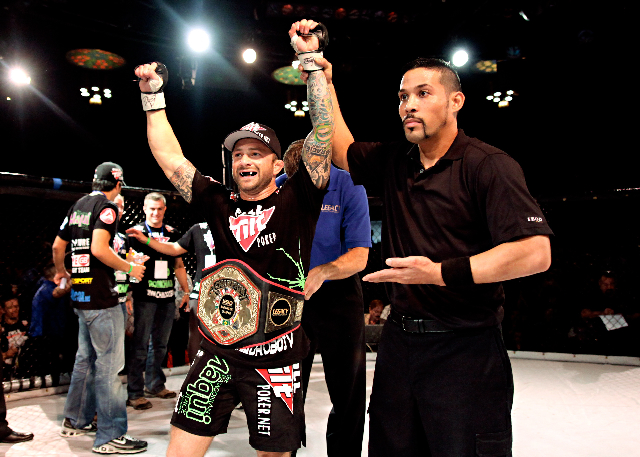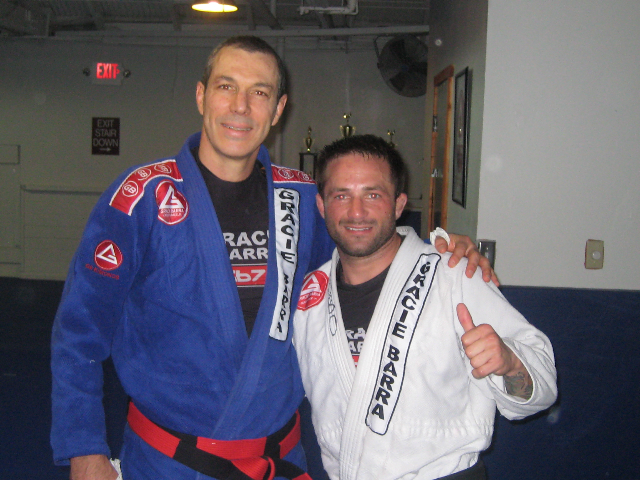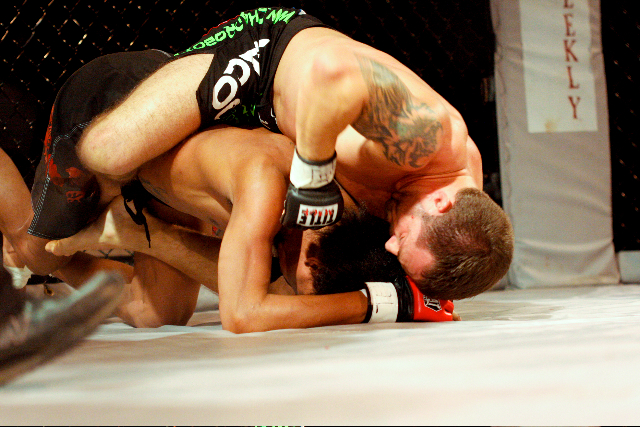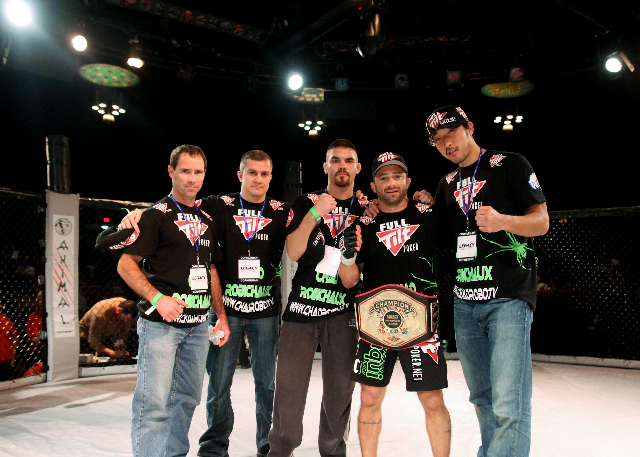Chad “Robo” Robichaux is the owner of three successful Gracie Barra schools in Texas: The Woodlands, Magnolia, and Champions Forest. With all that he does in a day just running his GB schools, it’s curious that he has time to train for and manage his second career as a professional MMA fighter. Robo, as he’s commonly known, has 16 fights under his belt, eight of them professional. He’s won the last 13 straight by submission. He was recently signed by Strikeforce and has his first fight with them on August 21st in Houston, Texas.
Successful MMA fighters today are not just street brawlers looking for a fight. The guys you see in the cage are elite athletes, exceptionally trained in a variety of martial arts and sports. Robo’s martial arts and MMA background is so stacked, it’s no surprise he’s been so successful in his fight career. This over-achiever’s been in martial arts for 30 years, since he was 5 years old.
Robo’s a black belt in Jiu-Jitsu under Master Carlos Gracie Jr and Professor David Viera da Silva of GB Rio. “I’m really lucky with my Jiu-Jitsu,” Robo says, “Draculino is my professor now and he helps me prepare my Jiu-Jitsu for all my bouts. I also have Professor Alex Gotay to train with, along with some very solid students.”
Robo is also a black belt in karate and in muay thai. He trains in muay thai with Daniel Kim, who is the current USMF and IKF Champion, and is on the USA National Team.
Along with the above accolades, Robo studies judo and kickboxing. As far as his standup goes, in Robo’s opinion, he has the best boxing coach in the world for coaching MMA fighters, Lewis Wood. Wood is a 33-1 pro boxer and, like Robo, is also a bantamweight, which helps considerably. He’s also a wrestling fanatic, and studies under coach Jody Trantham, who is a two-time NCAA wrestler.
That’s part of the training: to know how to keep going when you experience failure” Chad Robo
Robo believes it’s important to study each discipline independently, but it’s equally important to then be able to bring them all together into one well thought out, powerful game plan. The man who does this for Robo is Todd Moore. Moore is a two-time WEC and Dream veteran. He is a GB brown belt in Jiu-Jitsu under Robo and a long-time friend and coach at his GB Magnolia school.
“Todd is one of the most complete MMA fighters out there,” Robo says, “He understands how to put it all together, so I really trust him. He’s with me everyday and knows what I need. We really care about each other, and understand each other’s games and work ethics, so we work well together.”
Although Robo is a highly trained athlete in many arts and skills, he relies on his bread and butter – his Jiu-Jitsu – to help him close the deal during a fight. All 13 of his wins have been by submission. “I have to admit that a few of my submission wins were me intentionally trying to keep the streak going,” Robo says, “Being a Jiu-Jitsu loyalist, it feels great to win by submission and to be able to show my technical side. It also doesn’t hurt to have a 13 submission-win streak.”
Robo says when he was younger he was chastised by his Jiu-Jitsu coaches for not holding positions long enough to score points. “I’m not a points person,” he says, “I’m not too conservative. I think your personality reflects on the mats and I’m just one of those people – if I want something, I go after it.”
Robo doesn’t have a favorite submission, although he admits he likes armbars from the mount. “During a fight, I don’t push for any particular thing,” he says, I don’t even try to push for a submission. I do pressure my opponent for a fast pace and try to force them to make a mistake. Then I will capitalize on it. I’m very fundamentally sound. And I drill about 100 arm bars from the mount during my training everyday!”
If Robo does have a signature move, it’s “slamming” people to the mats with his wrestling, Judo and Japanese Jiu-Jitsu skills. “I know the fans like to see it,” he says, “I like to see my competitor’s feet over his head.” Although he may not push for a submission, Robo will definitely push for a throw because “I know it’ll get me in the next show.” He has a “give the fans what they want” kind of attitude. “Being successful to me means being able to dictate where the fight takes place,” he says, “The area between stand up and the ground is the take down, so I spend a lot of my time training them.”
Robo also spends a lot of time and care on his fitness and diet. “I’m always in shape and am always training and teaching at my schools. I do it full-time, so I’m always in the gym living my life. If I’m not in a fight, I’m getting someone else ready for one.”
He turns 35 this month, but he says he feels stronger now than at any other time in his life. “I don’t know if it’s old man strength,” he laughs, “But even if I’m training ten five-minute sparring sessions with ten seconds rest in between, I don’t get tired. I physically feel fine. The only time I feel it is if I get injured. I don’t recover as quickly as I used to, so I’ve learned to train smarter.”
Robo doesn’t think his age holds him back in any way. “In the Worlds I compete with the young black belts and it’s the older and wiser who tend to win,” he says, “To me, a good diet, good life habits, and hard work are way more important than the year you were born.”
When Robo first started out in MMA, he was young, confident and eager. “In 1997, I fought three times at a hole-in-the-wall called the “Chop Shop,” he says, “I think back on it now as kind of a foolish thing to do. There were no doctors, no match-ups, no weight-class, or even gloves. I showed up and the promoter asked who the fighters were and he matched us up by looking at us right there. I fought a Karate guy who must have outweighed me by 50 lbs! I submitted him after about 10 minutes of fighting and it was a great first experience, but I was quickly derailed when I went to Florida and fought a very seasoned Din Thomas, who submitted me in the first round. Just after that, I lost my 3rd match and decided to get back to training hard and focusing on the basics of Jiu-Jitsu and wrestling.”
So, Robo went back to the gym and perfected his skills. He fought again a year later in 1998, and hasn’t lost a fight since. “I submitted my next five amateur matches and six pro fights until like many others, 9-11 changed my life.” Prior to fighting, Robo was in the US Marine Corps and served as a Force Recon Marine.
For six years he was focused on serving the country through several efforts, some of which had him living in the Middle East and South East Asia for three months at a time. “Although, I trained the entire time, including about three years with Nate “The Great” Marquardt in Colorado when I was with the Marshall’s service,” he says, “the pro fight game really evolved while I was out. My 6-0 pro record seemed to have an expiration date on it, so I had to fight in a small show to get a current fight under my belt. I won that fight and then Legacy called me. They made me the main event and the title fight, which I also won over 10-3 Lewis McKwensi.”
That win earned Robo the Legacy FC bantamweight title. “The title bumped me up to the #1 ranked pound for pound fighter in my region as well as the #1 bantamweight contender, and now has me booked for Strikeforce on August 21st against #2 ranked bantamweight, Humberto Deleon,” he says.
Robo believes, along with all the mental, physical, and spiritual lessons he’s learned through Jiu-Jitsu, his drive, dedication to training, and intensity come from his Force Recon training in the Marines. “In recon training you are definitely exposed to your fail points,” he says, “You know what it feels like for your body and mind to quit on you. That’s part of the training: to know how to keep going when you experience failure. One of the worst things I think an opponent could do is tire me out, because then he’ll have a much more tuned-in and focused combatant to deal with for the next 30 or so seconds of the match.”
He says his combat experience has mentally prepared him for anything he faces in the ring. To him, MMA is just a sport with rules, not a fight. “You have rules you have to follow and a referee in the cage,” Robo says, “In combat, there are no rules in a fight, no ref and you’re usually fighting more than one guy, so when I’m in the cage, I’m not flustered or stressed out. I’m very composed. I respect the fight, but I don’t fear it.” Robo feels this experience gives him an edge over his opponents and has helped him secure his 8-0 professional record.
Whatever happens at Strikeforce Houston on August 21st, Robo says he looks at MMA as a battle ground between two martial artists to test their arts and skills. “Win or lose I think it’s an amazing test of yourself and your life’s work of training.”





